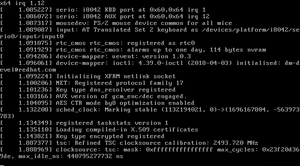Linux kernel mainline

Tux the penguin, mascot of Linux
|
|

Linux kernel 3.0.0 booting
|
|
| Developer | Linus Torvalds, as well as many other contributors |
|---|---|
| Written in | C and assembly |
| OS family | Unix-like |
| Initial release | 0.01 (17 September 1991) |
| Latest release | 4.9.10 (15 February 2017) |
| Latest preview | 4.10-rc8 (12 February 2017) |
| Available in | English |
| Kernel type | Monolithic |
| License | GNU General Public License, version 2 plus various optional freely redistributable (proprietary) binary blobs |
| Official website | kernel |
The Linux kernel is a monolithic Unix-like computer operating system kernel. The Linux operating system is based on this kernel and deployed on both traditional computer systems such as personal computers and servers, usually in the form of Linux distributions, and on various embedded devices such as routers, wireless access points, PBXes, set-top boxes, FTA receivers, smart TVs, PVRs and NAS appliances. The Android operating system for tablet computers, smartphones and smartwatches is also based atop the Linux kernel. While the adoption on desktop computers is low, Linux-based operating systems dominate nearly every other segment of computing, from mobile devices to mainframes. As of November 2016[update], all but two of the world's 500 most powerful supercomputers run Linux. The other two run AIX on IBM power 7 hardware.
The Linux kernel was conceived and created in 1991 by Linus Torvalds for his personal computer and with no cross-platform intentions, but has since expanded to support a huge array of computer architectures, many more than other operating systems or kernels. Linux rapidly attracted developers and users who adopted it as the kernel for other free software projects, notably the GNU Operating System. The Linux kernel has received contributions from nearly 12,000 programmers from more than 1,200 companies, including some of the largest software and hardware vendors.
...
Wikipedia
